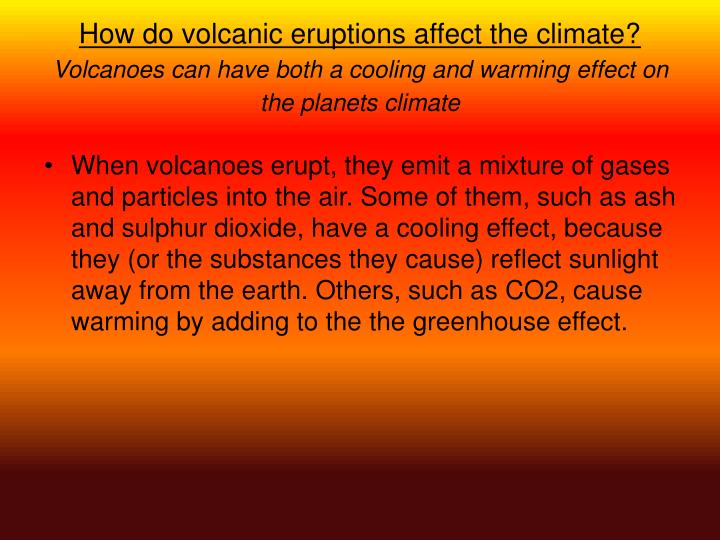Featured
How Do Volcanic Eruptions Affect The Weather
How Do Volcanic Eruptions Affect The Weather. But the effect is very small. Volcanic gases react with the atmosphere in various ways;

After an eruption, roofs on buildings may collapse and kill people if enough volcanic ash. During major explosive eruptions huge amounts of volcanic gas, aerosol droplets, and ash are injected into the stratosphere. Acid rain is one such form of precipitation high in sulfuric acid and that can cause erosion of any material it comes into contact with.
Volume Of Magma Released From Various Eruptions (Usgs) Volcanoes Typically Impact Weather Very Close By, Especially Erupting Volcanoes, This According To The “Volcano World” Web Resource Available Through Oregon State University.
However, this can only happen if the eruption is one of significance. During major explosive eruptions huge amounts of volcanic gas, aerosol droplets, and ash are injected into the stratosphere. From dramatic sunsets to mud rain, volcanoes can affect the weather in a number of different ways.
After An Eruption, Roofs On Buildings May Collapse And Kill People If Enough Volcanic Ash.
Volcanic eruptions can influence climate and global temperature because of the gases and dust particles spewed into the atmosphere during the eruption. Some of them, such as ash and sulphur dioxide, have a cooling effect, because they (or the substances they cause) reflect sunlight away from the earth. Volcanic eruptions inject, rapidly, quite a bit of heat and particulate matter into the atmosphere.
The Volcano Eruption Could Kill The Plants And The Animals Live Nearby Because Of The Hot Lava And Poisonous Gases.
First, they release the greenhouse gas carbon dioxide, contributing to warming of the atmosphere. Such greenhouse gases trap heat radiated off of the surface of the. Volcanoes can impact climate change.
The Main Effect On Weather Right Near A Volcano Is That There Is Often A Lot Of Rain, Lightning, And Thunder During An Eruption.
They can cause rain, thunder and lightning. Some of them, such as ash and sulphur dioxide, have a cooling effect, because they. Sulfur dioxide injected into the stratosphere by powerful eruptions reacts chemically, producing sulfur acids, which in turn form the same sulfate aerosols commonly.
Volcano Eruptions Also Change The Weather.
The second is how large eruptions will affect the weather/climate around the world. Others, such as co2, cause warming by adding to the the greenhouse effect. Acid rain is one such form of precipitation high in sulfuric acid and that can cause erosion of any material it comes into contact with.
Comments
Post a Comment